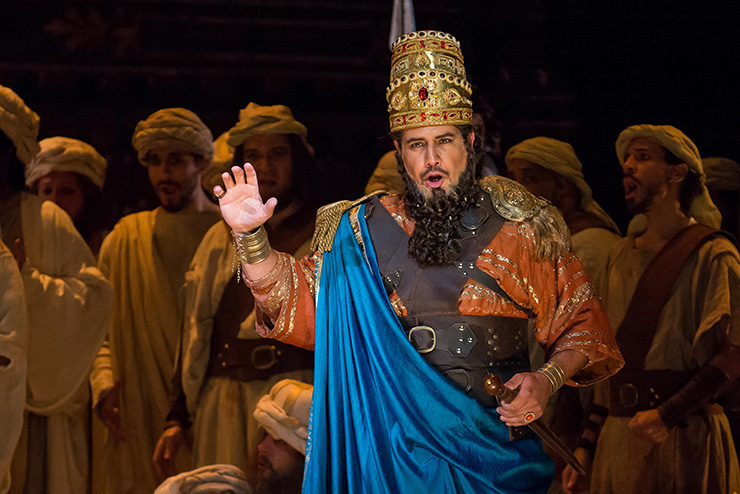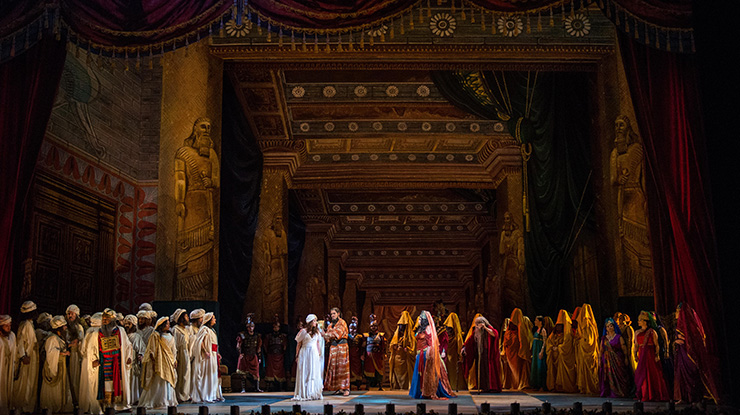After the abject failure of Giuseppe Verdi’s second opera, Un giorno di regno, he vowed never to write another note of music again. Perhaps he wanted to weave a romantic legend about himself to neutralize the embarrassment, as write he certainly continued to do!
Verdi embraced Temistocle Solera’s Italian libretto (text) for Nabucco, his 1842 opera showing up on opera’s radar screen ever since.

Photographer: Justin Namon
Dario Solari as Nabucco
The story line of Nabucco is largely spun out of whole cloth. From the Old Testament, Nebuchadnezzar, the King of Babylonia, did destroy The First Temple, enslave the Jewish people, and lose and regain his sanity, but this is where Verdi’s opera and history part ways. Other than the characters of Nabucco, Zaccaria (perhaps modeled on the prophet Jeremiah), and the Jewish people, the other characters are fictionalized. The historical events of the Israelites struggle against Babylonian domination was the backdrop for a romantic and political story – which does make for good theater.
Verdi was developing his melodic voice, full of texture and color, advancing the opera form that he inherited from Rossini, Bellini and Donizetti. He was learning how to propel the dramatic action and build a sense of increasing speed. Italian audiences bought it.
Florida Grand Opera opened Nabucco at the Adrienne Arsht Center last Saturday night to a sellout crowd.
The overture was that of a competent musician hitting his stride. From its quiet beginning, to its introduction of “Va, pensiero,” to its hard driving gallop, Verdi uses his strings, winds and brass to full blown effect.

Photographer: Justin Namon
Maria Guleghina as Abigaille
Basso Kevin Short played the imposing high priest Zaccaria, his sonorous voice conveying strength and compassion as he implored the Hebrews in Solomon’s Temple to trust in God – “D’Egitto là su i lidi” / "On the shores of Egypt He saved the life of Moses" – attempting to quell their fears from a looming Babylonian threat. Short handled all of his assignments from the attic to the basement smoothly and completely.
Nabucco’s youngest daughter Fenena (mezzo soprano Mabel Ledo), held hostage at the Temple, and Ismaele (tenor Martin Nusspaumer), nephew of the King of Jerusalem, blended well as the unlikely lovers.
The huge vocal demands placed on the character of Abigaille (the alleged older daughter of Nabucco), requiring her to repeatedly leap off a vocal cliff into the pool of her chest voice, has limited the number of productions Nabucco has realized. There have been sopranos whose careers were cut short, permanently damaging their voice after singing Abigaille. At any time, there are usually only a handful of sopranos willing and able to tackle the role. FGO brought in two of them to deliver the grueling high tessitura: Ukrainian Maria Guleghina and Florida’s own Susan Neves.
Abigaille arrives at the Temple with her soldiers. Guleghina, Ledo and Nusspaumer dramatically trio (“Io t’amava! Una furia e quest’ amore”) Abigaille insisting that Ismaele love her and not Fenena. She will petition Nabucco to spare the Jews if he relents. Ismaele tells her to go pound sand.

Photographer: Justin Namon
Inside the royal chamber in Babylon, Abigaille learns from a secret document that she is not Nabucco’s daughter, but the daughter of slaves. She rails for revenge, then suddenly softens as she muses on her love for Ismaele. Guleghina renders this contrast beautifully, moving her body and soul seamlessly from her raging recitative to the sweetened music of “Anch’io dischiuso un giorno” / “I too, one day, opened up my heart to happiness.” Verdi would exploit this contrasting musical device in future operas. “Bravas” for the brokenhearted diva were abundant from the audience.
Lyric baritone Dario Solari used his considerable talents as actor and singer to give Nabucco gravitas in both his sanity and insanity without going over the top in either mental state. When Nabucco proclaims himself God and a lightning bolt strikes him down, removing him from reason, Solari moves us with his wide penetrating pipes as he asks, “Chi mi toglie il regio scettro?” / “Who is it that takes my royal scepter from me?,” keeping it real when it could easily have turned cliché. Abigaille seizes the crown.
Another device Verdi used to great effect was the contrasting duet, where both characters clearly are inhabiting such different places of the mind.

Photographer: Justin Namon
Tricked by Abigaille, Nabucco realizes he has unknowingly signed an edict to put the Jews to death, including Fenena, who has converted to Judaism. Solari sings a tortured lament as Guleghina eerily sings of rage and revenge – “Oh, di qual’onta aggravasi questo mio crin canuto!” / “Oh, what deep shame afflicts my grey hairs!” The tension and release was profound from the pair.
Jailed and watching Fenena being led to her execution, Nabucco drops to a knee praying for forgiveness – “Dio di Giuda! L’ara, il Tempio at sacro, sorgeranno” / “Judah’s God – the altar, the Temple sacred to Thee shall rise again.” Solari choosing to keep this aria simple and sincere was spot on and beautifully honest. Musically, this was the most appropriate portrait of a heartbroken and contrite individual. Nabucco returns to sanity.
Before Fenena is to be stoned to death, Ledo (we need to hear more from this flawless mezzo) renders prayerfully, “Oh, dischiuso è il firmamento!” / “Oh, the firmament is opened up!”
Accompanied by a strikingly beautiful English horn solo played by Catherine Weinfield, Guleghina delivers Abigaille’s dying aria (“Su me . . . morente . . . esanime . . . discenda . . . il tuo perdono!” / “To me . . . dying . . . faint . . . let your pardon be given!”) with the proper amount of wrench that all grand opera requires, lovely in its finality.
A cornerstone of Verdi opera is the chorus, big and in your emotional face. It was born in Nabucco and heard profoundly in the Chorus of the Hebrew Slaves, “Va, pensiero, sull’ali dorate” / "Fly, thought, on golden wings."
At the time Verdi wrote Nabucco, tensions ran high in Northern Italy from Austrian occupation. “The Israelites’ yearning for their homeland resonated with the Italians’ increasing desire for a unified nation of their own.”
“Va, pensiero” is often encored at performances of Nabucco, its memorable, solemn and hopeful unison voice, beginning gently and building emotionally only to land softly into a quiet murmur, stays with you for days after you leave the hall, a testament to Verdi’s gift for melody.

Photographer: Justin Namon
Chorus master Michael Sakir prepared the FGO chorus well, the audience invited and accepting to sing “Va, pensiero” along with the chorus a second time. The smiling and handsome Maestro Ramon Teber turned his back on the singers and orchestra and conducted the audience in the encore, all welling up on this one.
Other fine performances were given by bass Adam Lau (Priest of Babylon), soprano Jouvanca Jean-Baptiste (Anna, Zaccaria’s sister), and tenor Casey Finnigan (Abdalio, Babylonian soldier).
Costumer Mattie Ullrich kept the Hebrews in white and the Babylonians in colorful contrast.
Justin Moss, Director of FGO’s Broward Operations, described Thaddeus Strassberger’s sets as “featuring highly realistic drops, beautifully painted in the tromp l’oeil style (deceive the eye) as would have been seen at La Scala in 1842, when Nabucco had its premiere. It creates the illusion of great depth in both the Temple in Jerusalem and the palatial temples in Babylon.”
Moss also remarked about Verdi, “It was fun to see the very beginning of one of the great careers in music that literally defined the tradition of Italian grand opera in the final century of its flourishing.”
Conductor, Ramón Tebar; production and set designer, Thaddeus Strassberger; stage director, Leigh Holman; chorus master, Michael Sakir; lighting by Mark McCullough; costumes by Mattie Ullrich
Remaining performances: Sung in Italian with projected titles in English and Spanish Adrienne Arsht Center for the Performing Arts of Miami / Ziff Ballet Opera House January 31 & February 1, 2014, at 8:00 p.m. Broward Center for the Performing Arts / Au-Rene Theater February 6 & 8, 2014, at 7:30 p.m. www.FGO.org
 MAIN MENU
MAIN MENU

